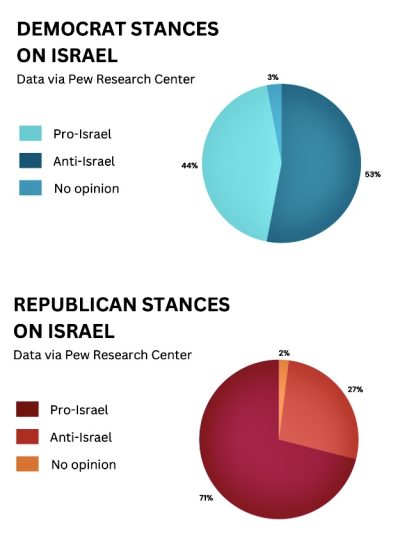Presidential candidate and current Vice President Kamala Harris has supported Israel throughout her political career. Still, her position has started to become problematic to voters who feel Israel has overstepped its moral bounds.
If Harris is elected, her policies will continue with the United States providing more arms and financial support to Israel.
“I will always give Israel the ability to defend itself,” Harris said during the Presidential debate. “We need a ceasefire deal, and we need the hostages out,” she adds.
On October 7th, Hamas attacked a music festival in Israel, killing over 1,150 people and kidnapping more than 70 hostages. Since then, at least 42,000 Palestinian civilians have been killed by Israel, most of whom were women and children, according to Qatari news site Al Jazeera. On September 23rd of this year, Israel launched an attack targeted at the Hezbollah militant group in Lebanon, killing at least 492.

These statistics have shaken voters across the United States, and many have started to feel hesitant about supporting Harris’s campaign because of her stance on the issue.
According to USA Today, 101,000 “uncommitted” votes were cast in the Michigan Democratic presidential primaries in protest of the war in Gaza. Across the nation, over 700,000 people voted “uncommitted” in March.
President Joe Biden’s pro-Israel stance lost him over half a million votes in the primaries, but will something similar happen to Harris during the presidential election?
According to Al Jazeera journalist Maura Finkelstein, “If Harris wants the progressive vote, she has to support an arms embargo on Israel… this is a red line for many of us,” she states in her article titled “Why I am not voting for Kamala Harris.” “if [Harris] does not change her policy on Israel, I will not be casting a ballot for her,” she adds.

Other voters feel differently. One Democrat, Jennifer Mahnke, believes that the consequences of Harris losing the election outweigh the controversial parts of her policy and disagrees with those who voted uncommitted in the primaries.
“I feel like their vision is too narrow,” Mahnke states. “We can’t be picky about areas where we disagree with her because so much is at stake in the larger picture.”
“If we lose our democracy, then everything else falls apart,” Mahnke adds. “To me, it’s ultimately about stopping Trump and his policies.”
Republican candidate and former president Donald Trump shares Harris’s pro-Israel stance and has also expressed the need for peace between Israel and Hamas.

“I will get [the war] settled fast,” he stated during the debate. “I’ll get it done before even becoming president.” Trump didn’t elaborate on this plan during the debate, leaving much of it to interpretation.
Trump, despite also being a supporter of Israel, has faced less backlash for his stance. According to the Pew Research Center, Republicans tend to have a more positive view on Israel than Democrats do.
This puts many pro-Palestine voters in a difficult spot, as they will have to choose between two pro-Israel candidates on Election Day. Harris’s stance on Israel will, without a doubt, cost her thousands of votes, but will this be enough to make her lose the election?



















